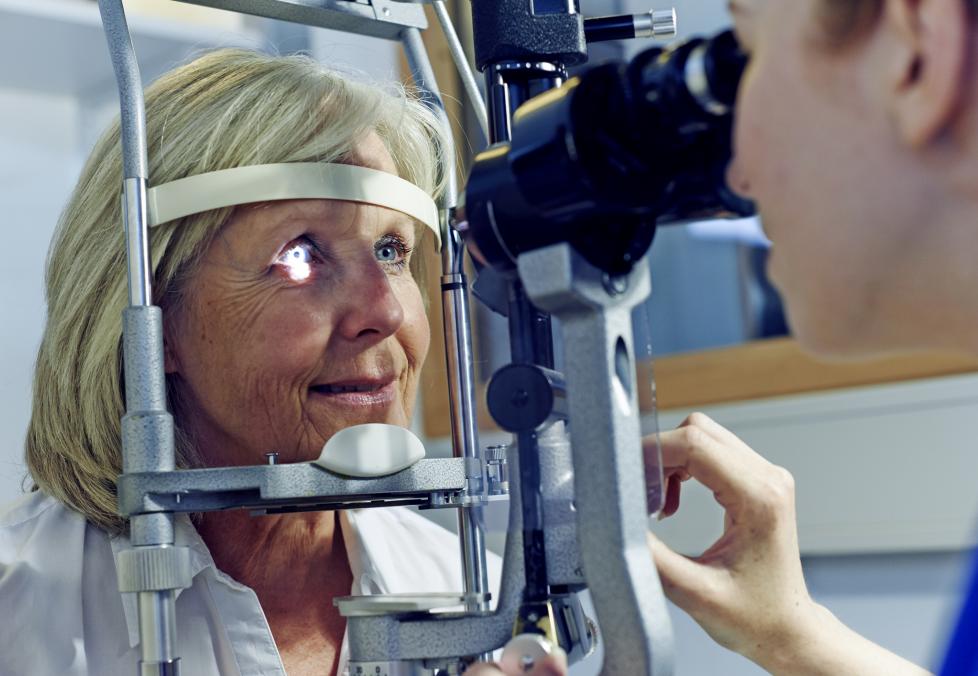
Now’s the perfect time to book an eye exam, shop for new glasses, or stock up on contact lenses.
Everything you need to know to take care of your eyes — for life.
When you need an eye care specialist, who should you call? Here’s your guide to the three O’s: opticians, optometrists, and ophthalmologists.

At America’s Best Contacts & Eyeglasses, we’re incredibly proud of our network of skilled and experienced eye care professionals, including opticians, optometrists, and ophthalmologists. But please don’t ask them to deliver your baby.
“I’ve been asked if I’m an obstetrician!” laughs optometrist Laurie Lesser, O.D.
Most people have no idea what the difference between an ophthalmologist, optometrist, and optician actually is. In fact, it is one of the most-searched eye-health-related questions on Google.
Each eye care specialist plays a vital role in your vision care, says Dr. Lesser. Consider this your CliffsNotes guide to the three O’s.
Have questions about your eye health or vision? Your America’s Best optometrist is here to help. Click here to find an exam time that fits your schedule.
The person at the optical shop who helps you select a trendy pair of eyeglasses to impress your classmates at a high school reunion—that’s an optician.
Opticians fit you for glasses and are up-to-date on current frame styles. They can walk you through the pros and cons of all of the various lens materials and coatings, says Dr. Lesser, helping you walk away with glasses that look and feel great.
When your frames need a quick repair or adjustment, opticians can get you squared away. They can also help you get the hang of putting in contact lenses and show you how to care for them at home.
Most opticians work in retail vision shops or within an optometrist’s or ophthalmologist’s office. Laws vary, but some states allow opticians to learn on the job and get licensed through an apprenticeship. Other states require opticians to complete a two-year college program first.
Recommended reading: 6 Things Your Optician Can Do Besides Help You Find New Frames

Now’s the perfect time to book an eye exam, shop for new glasses, or stock up on contact lenses.
Most often when someone tells you they are going to the eye doctor, they are referring to an optometrist. Optometrists are primary health care professionals for the eye. “We’re able to solve about 80 percent of eye problems,” estimates Dr. Lesser.
Besides prescribing glasses and contact lenses to correct vision problems, optometrists can write you a prescription for eye drops to treat an eye infection or other eye diseases. In many states, they can also prescribe oral medications.
Optometrists are better able to diagnosis eye infections than your family doctor, Dr. Lesser says, “because we have the correct equipment to see into the eye and determine the root cause.” They also know more, in general, about the eye and how it works.
Optometrists are also on the front lines of diagnosing and treating many eye diseases, including potentially blinding conditions like glaucoma and cataracts.
“If your eye condition is complicated, or you need surgery, we’ll send you to an ophthalmologist,” she says. (See next section for more on ophthalmologists.)
Optometrists might also specialize in low vision or vision therapy. Low-vision specialists toggle between helping people deal with age-related macular degeneration (an eye disease that can make it difficult to see well enough to go about your daily activities) and working with people who have recovered from a stroke but lost a piece of their visual field.
Vision therapists might help kids whose eyes don’t work together, or even assist rising athletes who wants to improve the eye skills needed to better track a fast-moving ball, she says.
An Optometrist’s education. Optometrists must have at least three years of undergraduate education before attending optometry school. Many optometry school applicants possess a bachelor's degree or higher. Optometry school is a four-year program that culminates with licensing clinical examinations to be certified by the state board. Their degree is called a doctor of optometry (O.D.). For those who want to specialize in a particular area, such as pediatric optometry, a clinical residency may be necessary.
An Optometrist’s role. An optometrist sets up a practice or joins an existing practice to offer comprehensive eye exams to patients. In this eye exam, they can not only address any vision problems but also discover many different types of eye conditions and diseases including glaucoma and macular degeneration. Optometrist may not be able to treat every eye disease and will refer the patient out if the need arises.
After an eye exam is complete, the optometrist can prescribe prescription eyeglasses or prescription contact lenses to correct vision issues. In addition, some patients may also receive prescription sunglasses.
Schedule an appointment with an optometrist.
Press play to learn what to expect during your eye exam:
You may have heard of an eye M.D. and wondered, what does that mean? That’s an ophthalmologist. This caregiver has a medical degree—either doctor of medicine (M.D.) or doctor of osteopathy (D.O.)—and specializes in the medical and surgical care of the eyes.
Yes, they can test your vision and write a prescription for glasses or contact lenses, says Dr. Lesser, but most are focused on diagnosing and treating eye diseases and eye injuries.
Some ophthalmologists also choose to specialize in one particular eye condition, such as glaucoma or conditions that affect your retina—the internal layer of the eye that allows you to see.
Other ophthalmologists limit their practice to treating the eye care needs of children or people who need reconstructive eye surgery. And still others get involved in scientific research, searching for cures for various eye problems.
“They’re surgeons and disease specialists,” says Dr. Lesser, adding that they’re not usually necessary if you’re booking a routine comprehensive eye exam.
Ophthalmologists go to medical school and complete an internship, a residency, and often return to med school for additional specialized training. They are the only visual specialist licensed to perform major eye surgery.
That depends on your needs, says Dr. Lesser, noting that most of us will wind up seeing each of the three at some point in our lives.
For routine eye care, contact lens fittings, and regular eye checkups, your optometrist is usually the best option. In fact, your health and vision insurance plan might require you to see an O.D. first. An optometrist is an eye doctor who focuses on vision health and correcting vision problems. Optometrists or eye doctors who study to be able to diagnose and treat a wide variety of eye diseases and eye conditions. This includes diagnosing vision problems and prescribing eyeglasses or contact lenses.
If you’ve been diagnosed with a serious eye condition, or are considering laser or other eye surgery, start with your optometrist, but don’t be surprised if they ultimately work in concert with an ophthalmologist to make sure you get the care that’s right for you.
Optometrists are not licensed to perform surgery. However, many times optometrists discover the condition during a routine eye exam that prompts the need for surgery. The optometrist can then refer the patient to an ophthalmologist who can perform eye surgery. Many times, the optometrist and ophthalmologist will work together to ensure the best care. The optometrist may also handle all pre-surgical and post-surgical visits.